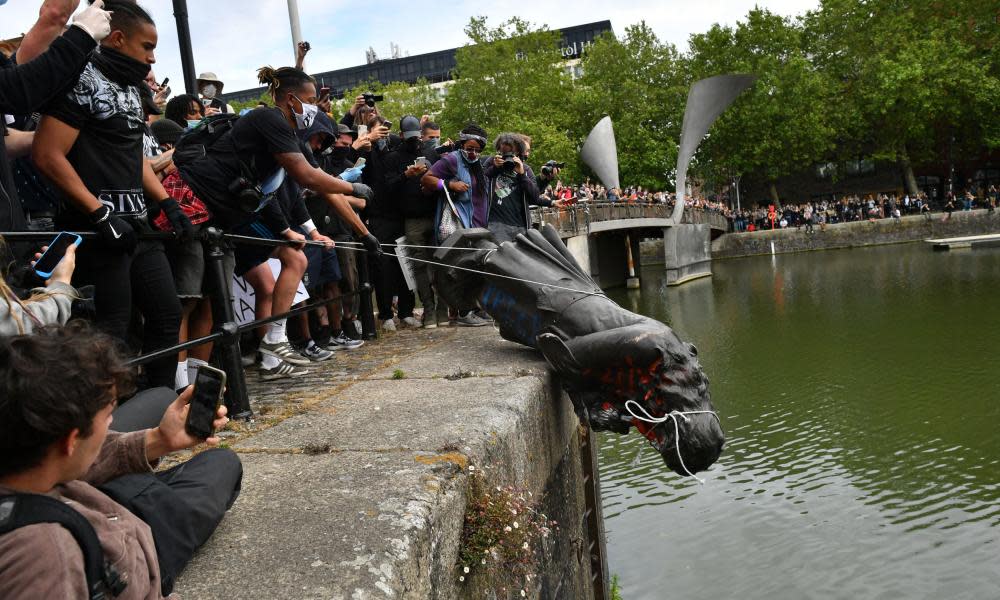Colston four: protesters cannot rely on ‘human rights’ defence, top judge rules

Protesters accused of “significant” criminal damage cannot rely on human rights protections when on trial, the court of appeal has said.
The ruling comes after the attorney general made a referral on a point of law following the acquittal of the Colston four. Suella Braverman, who is now home secretary, made the referral after Conservative MPs criticised the acquittal of protesters who toppled the Bristol statue of the slave trader Edward Colston.
A range of defences were used in the case. The court of appeal was asked to consider one that argued that a conviction for damage to the statue would have been a disproportionate interference with the defendants’ right to protest under the European convention of human rights.
Juries have an unqualified right to acquit, and the higher court’s decision does not affect the outcome in the Colston case. However, it means defendants in similar cases will not in future be able to rely on the convention’s rights to freedom of thought, expression and assembly.
In a written judgment published on Tuesday, the lord chief justice, Lord Burnett of Maldon, said: “We have concluded that prosecution and conviction for causing significant damage to property during protest would fall outside the protection of the convention, either because the conduct in question was violent or not peaceful, alternatively (even if theoretically peaceful) prosecution and conviction would clearly be proportionate.”
However, Burnett, representing all three judges who heard the case, said that were the criminal damage “minor or temporary”, the proportionality of conviction would have to be considered by the court. They expected such prosecutions would not be brought because they “would be a disproportionate reaction to the conduct in question”.
While welcoming that caveat, the UK human rights organisation Liberty, which intervened in the court of appeal case, and lawyers who defended the Colston four at trial, expressed disappointment with the overall ruling.
Katy Watts, Liberty’s lawyer, said the judgment “takes away vital protections that empower everyone to be able to stand up for what they believe in … By placing weight on the value of an object in deciding if human rights can be taken into account, we feel that the court is shifting the balance too far away from our essential human rights.”
Liberty said rights to protest had been severely weakened by the Police, Crime, Sentencing and Courts Act, passed this year, and would be damaged further if the public order bill was passed.
Raj Chada, a partner at Hodge Jones & Allen, who represented two of the Colston four, said: “In our view, the evidence at the trial was that the toppling was not done violently. The clear view from an expert valuer, which we were prevented from relying upon during the trial, was that the value of the statue had increased exponentially after the toppling. The statue is still on public display as a monument to the evils of the slave trade, not as an obscene glorification of a slave trader.”
Tom Wainwright, from Garden Court chambers, who represented one of the Colston defendants, said the impact of the decision was unclear “because it’s difficult to tell what a court will decide is significant and insignificant damage and what they will interpret as violent in the context of damage to property”.
Responding to the ruling, Rhian Graham, one of the four defendants, said pulling down the Colston statue “was not a violent act.
“It was the cathartic removal of a memorial to an oppressor of people and an abuser of power who had too long loomed over the people of Bristol,” she said. “The fact that it is gone is still right for Bristol.”
She added: “The positive impact of the toppling – for both Bristol and the anti-racism movement as a whole – can never be undone, and this judgment cannot overturn the decision made by a jury of our peers.”
The attorney general’s office welcomed the ruling, adding that it was “pleased the law has been clarified concerning the proper scope of certain defences to criminal damage charges arising from protests”.

 Yahoo News
Yahoo News 
